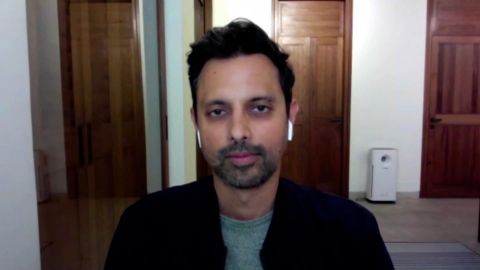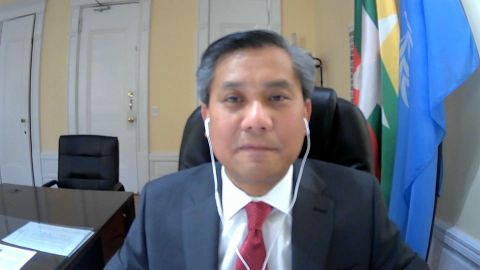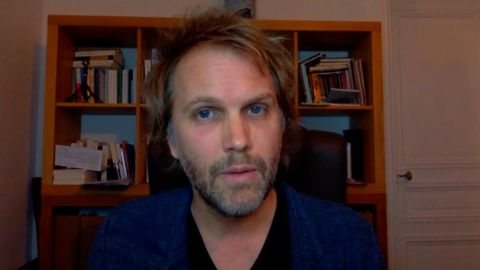Read Transcript EXPAND
CHRISTIANE AMANPOUR: Turning now to another film critics are already calling a roaring success. It has also just been nominated for two BAFTAs. “The White Tiger” tells the story of a Balram, a poor but shrewd young driver in India battling against the country’s culture of servitude and inequality, otherwise known as the caste system. It is based on the 2008 Booker Prize-Winning novel by Aravind Adiga. And Mukul Deora is the producer. And here he is talking to our Hari Sreenivasan about the Netflix movie which he spent a decade making.
HARI SREENIVASAN: Thanks, Christiane. Mukul Deora, thanks for joining us. Your film has just been nominated for BAFTA awards. It’s doing great in several countries around the world. For those who haven’t seen the film, here is a quick look at the trailer.
BALRAM: When I first saw him. I knew then this was the master for me. I want to be a driver for your son.
ASHOK: Balram, have you ever seen a computer?
BALRAM: We heard many of them in the village with the goats.
ASHOK: The goats are very pretty advanced to use computer.
PINKY: OK. Now, you’re being a jerk.
BALRAM: I didn’t like the way he had spoken about me. Since I was a boy, the desire to be a servant had been hammered into my skull. I, Barlam, I drove the car. I was alone in the car. They made me sign that confession.
SREENIVASAN: This is a haves and have not story. When you look at kind of — that narrative of having a struggle between someone’s coming up, that’s as old as movie making, as old as storytelling, but what was so compelling to you about this particular type of story?
MUKUL DEORA PRODUCER, “THE WHITE TIGER”: You know, a bunch of things. Firstly, it was set in India, you know, that I knew but it was so fresh for a book, a prize-winning book. It’s written so economically, so direct. And, you know, honestly, the genius of the author, Aravind Adiga’s writing is that these concepts that he created, the half-baked man which is this person whose knowledge has come from here and there from limited bits, like lizards falling from the ceiling into your head. Beautiful, you know? The Rooster Coop, which is a central concept of this movie as well. You know, why are so many people all over the world trapped in servitude? Because like rooster, they just can’t escape. I think that is a very important thing for me that when I read it, I felt I’m reading something else, you know, I’m reading — this isn’t a normal, you know, book of fiction. It is just so deep. And, still, you know, so funny and so dark. Really cuts to the bone basically, I think. But to your point about, you know, what would someone in the world think? Yes. It is a story of haves and have nots. And I think everyone has to break free, you know, whether it’s societal or familial or financial. You know, breaking free is really an evolution that you have to go through in different ways. So, I think people could relate in that way as well.
SREENIVASAN: There is another clip I want to show. It’s kind of a little bit of the relationship between the driver and who he is driving. Let’s take a look.
ASHOK: Do you know what the internet is?
BALRAM: No, sir. But I could drive to the market right now, sir, and get as many as you want.
ASHOK: No. It’s OK. Thank you. Do you have Facebook?
BALRAM: Yes, sir, books. I read a lot of books, sir.
ASHOK: Yes, I heard you can read. Have you ever seen a computer?
BALRAM: Yes, sir. Actually, we had many in the village with the goats.
ASHOK: Goats?
BALRAM: Yes, sir.
ASHOK: The goats are pretty advanced to use computers?
BALRAM: I could tell from their faces I had made a mistake.
ASHOK: You see? He has two, three years schooling in him. He can read and write. But he doesn’t get what he’s read. He’s half-baked.
PINKY: OK. Now, you’re being a jerk. He is standing right there.
ASHOK: No, I’m not. I’m not being a jerk.
PINKY: Come on.
ASHOK: You’re missing the point here. Our driver represents the biggest untapped market in India waiting to serve the web by a cell phone, rise up into middle class, something I can help him do. You are the new India, Balram.
BALRAM: I am the new India, sir.
SREENIVASAN: You know, there’s people that are going to watch this and say, well, this is almost a conversation between Netflix and India. You’re the new market. You’re the place that we want to get. You are who we want to reach because we see massive growth potential there. I mean, and — well, really, so does anybody selling any products on the market.
DEORA: Any product, any product, right. You know, it is interesting, because actually those three people, they are all three different Indias. Pinky Madam is an Indian that we all know who is not really Indian. She spent most of her life abroad. She’s not really — doesn’t have any roots in India. And she comes back and she is completely alien to the whole thing, you know, just looking around and like oh, my god, shocked or — but she is the agent of change because she doesn’t have those shades on her. Ashok is another India we know who is born and brought in India but has spent some time in the west. He’s got a mix accent. He is, you know, in the middle. He’s like, you know, I’m a little bit this, I’m a little bit old school. I’m like my dad and I’m not. I’m trying to be friends with my staff. And the Balram is the new India. You know, as you said, the India that the whole world is jumping in to be, you know, to sell things to basically. And the movie is like a family tree. It’s all showing different Indias, different parallel universes that exist in terms of how they view power, how they view opportunity, you know, how they — you know, people born to servitude. The have and the — different levels of the haves and have nots and exposure from different parts of education coming together. And like you — you know, that’s a very interesting because that shows in a little snapshot of the whole thing, it shows what is globalization today, what is the valuation of all the big tech companies because they have to be in India and slam it out and spend billions of dollars, because if they don’t, there’s no growth.
SREENIVASAN: Is there something in the air here? I mean, just a couple years ago we had the success of “Parasite” which kind of looked at literally this underbelly that was happening that nobody really wanted to discuss, they just knew that it existed. And here you are talking about a kid from a village who, you know, it locked into a class structure.
DEORA: I think what’s happened in the last many years is that, there’s two things. There’s globalization that’s happened, you know, in a massive way, India is, you know, along with China are the fastest growing markets in the world. So, you have the powers that be — in the media and entertainment business. You know, the Netflix, Amazon, the studios who are all now — you know, they have to be in India and they have to, you know, engage with that whole thing. So, there’s that bit. But in the same time, in America, as you know very well, there was an awakening, I guess, in the last few years of — you know, on the systemic issues that were there and continue to be there since time memorial, I mean, in everything we do, but specifically in the media and entertainment industry it became, you know, very clear and very strong, maybe exacerbated by what happened in the last four years in America, I think it definitely made — you know, put a merit to people’s faces as well and forced everyone to have uncomfortable conversations and take sides. And I think those two things together — these stories were always there, you know, whether you’re — like you said, a Korean domestic staff, an Indian driver, a Mexican housekeeper in Roma, these stories were always there, they were always amazing stories, and I believe there is always an audience for them but it just wasn’t clearer to the part that be (ph) that that — you know, how do they reach that audience, does that audience exist, was it financially viable to make something, to reach that kind of audience. And now, those — let’s call them beautiful experiments, are happening and gaining momentum everywhere and people want to hear honest stories and people feel, you know, connected to these kinds of things, definitely. Yes.
SREENIVASAN: You know, I mean, I was born there. I’m still connected to the country. My relatives are there. Each time I go, sometimes I notice the changes. But one of the things that your film points out is how much of India has changed, even beyond the Incredible India campaigns and the huge leaps forward and sort of technological dominance that the country has had and there is this core of this story of Balram that regardless of what part of the country you go to, you can still see.
DEORA: I mean, honestly, what has happened and what I think that pandemic has really exacerbated as is this battle to — you know, now, at least people are aware of it that, what is it like, I don’t know, 80 percent of the world is controlled by one percent of the population. And yes, I read somewhere that that 30 families control 50 percent of that world. You know, some — you know, the numbers are just insane. So, honestly, I think that’s happened, you know, when I look at England, when I look at America, when I look at India, when I Look at every country in the world has this massive inequality problem. Yes, and I think this movie just shows that basically, you know, and what some — the cost of freedom. I mean, that’s — I think that’s — when people ask me what is this story about? I say, for me, it’s different. A lot of people say ambition. But for me, it’s about freedom and the price that someone has to pay, and how high is that price. We all have a price of freedom. But for Balram, it was a very, very high price to pay.
SREENIVASAN: One of the things that the character brings out is how he normalizes sort of the situational ethics of this inequality. Let me play another clip here.
BALRAM: Over the week’s, I learned the ways driver cheat their masters. Number one, give your master phony invoices for repairs that are not necessary. Two, sell your masters petrol to other drivers. As you gain confidence, cruise around picking up and dropping off paying customers. Delhi has many pick up points. Overtime, you will learn them all. When I looked at that cash, I didn’t feel guilt, I felt rage (ph).
SREENIVASAN: I want to ask a little bit about the star that we’re seeing here, other scar of his preparation for this was a bit intense.
DEORA: It was very intense. You know, it started with — when we — when Ramin, the director, and me saw him in the auditions. I remember we spoke to each other and we said, this is the first person we’ve seen convincing a bunch of people. Let me see Balram. That’s Balram. We don’t see — there’s no artifice. There’s nothing. It’s just him. And he — I mean, you know, after, you know, we — you know, we agreed that he would do it and everything, he became a driver without the people knowing it. He went to, you know, a village in that region and spending a lot of time there. I’ve been to a mall when we were prepping. And I was getting on the car and I turned left and I saw him sitting and chilling with a bunch of drivers and he just looked at me dead and, you know, then maybe there’s a twinkle, maybe there wasn’t and I didn’t see anything. And, you know, that was him just being in that zone. You know, he got menial jobs as well. Like real menial jobs. You know, lifting things, carrying things. And he really read into it, yes. And it shows, you know, it shows.
SREENIVASAN: It’s also because his acting skills, I mean, he makes Balram, well, likable at times. I mean, depending on whether you see him as the hero or the villain or of some combination thereof, it’s a very fine sort of tightrope to walk and it was just intriguing to watch kind of his innocence fade throughout the film.
DEORA: It was — it’s true and it was a very, you know, important thing for us to make him likable as well. You know, because the story is — it’s an indictment of humanity on one hand but it is also a celebration of humanity. Because at the end of the movie he’s like, I’ve made it. You know, yes. I’m done. So, it had to have, you know, that flow where you do – – I mean, look, killed someone. He killed someone who’s not necessarily the worst person at all in this — you know, a weak person but not worth, you know, killing. So, you had to make him likeable so you, you know, empathize with him through the whole journey and you really feel for him, you feel for his ups and downs, highs and lows and all that. But, you know, that clip that you just showed me just reminded me of something. I was just going to share with you which is that, you know, so many people have called me up and said this and that and everything, but older people in India, like friends’ parents or parents’ friends. I met a friend of my mother and she sat down with me and she said, I want to tell you about the movie. And I said, sure, aunty. And she was like, I couldn’t sleep for four nights after I watched the movie and I was thinking, should I — I’m a good person. I take care of my staff. I’m good to them but we don’t do enough. We just don’t do enough. There’s so much more that we can. We really have to do more.
SREENIVASAN: You know, after having studied and read the book for so long, after having watched the process of making the movie. Why do you think class or caste or your place in society still has the power that it does?
DEORA: Oh, that’s a good question. I think it was just human nature in some way to, you know, bill systems of — I guess it’s one part of human nature to build systems of subjugation, you know. And because — I mean, when you look, what is the history of the world? The history of the world is written in blood. It’s all subjugation, slavery, you know, horrible atrocities committed in the name of economic growth sometimes, not even something, you know, like racism. It’s just like economic growth. And we have to grow and these are the brown skin or black skin or whatever different people from us, we are going to, you know, be our workforces and help us grow to where we have to grow. Same skin people. I mean, people had — you know, you had people doing the same thing to people of their own race. So, I think when you look at history of the world, it is that. And I think — you know, I like that saying, all that a good man has to do to ensure the triumph of evil is nothing. So, you — you know, and you saw what happened in America in the last — you know, this whole this whole amazing on circus that’s happened. And there’s hope. You know, who knows.
SREENIVASAN: Mukul Deora, the film is called “White Tiger,” it’s on Netflix. Thanks so much.
DEORA: Thank you.
About This Episode EXPAND
Ambassadors Kyaw Moe Tun and Barbara Woodward discuss the military coup in Myanmar. Filmmaker Florian Zeller explains the inspiration behind his BAFTA-nominated film “The Father.” “The White Tiger” producer Mukul Deora joins Hari Sreenivasan to talk caste, class and globalization.
LEARN MORE



